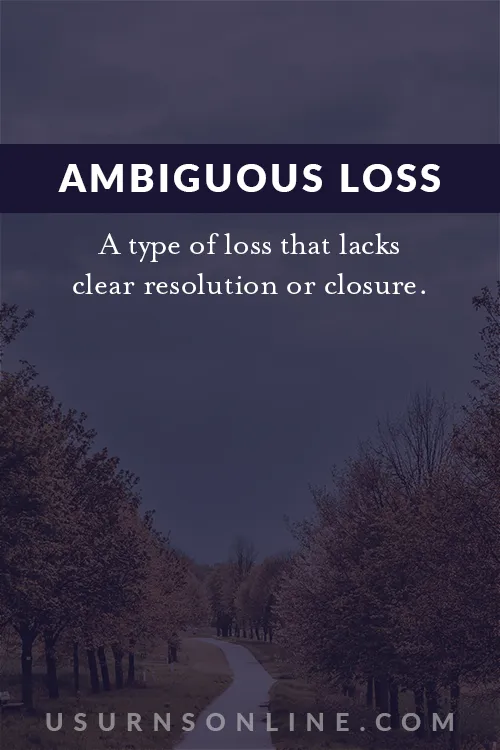Grieving over the loss of a loved one is difficult no matter what type of loss you’re experiencing.
Yet there is a sort of “certainty” that closure will come. This is what makes healing possible.
Loss is a universal experience. Ambiguous loss is different, though.
Maxime Vossen knows this kind of grief. In 2020 she was diagnosed with stage 4 cancer. Her condition is treatable, but not curable. Now her life is on a much different trajectory than she ever expected.
“There’s a lot of loss of identity that comes from being so ill, not just for the person you were but also for the person you could be,” she says. “I think it’s very important for cancer patients as well as for the people around them, to acknowledge that and hold space for that.”
With ambiguous loss, the possibility of closure remains uncertain. This leaves you stuck in a state of limbo. The lack of resolution makes grieving an even greater challenge for the individual as well as their family relations.
What Is Ambiguous Loss?

The concept of ambiguous loss refers to a type of loss that lacks clear resolution or closure.
Unlike traditional loss—where death is clearly defined—ambiguous loss occurs when individuals experience grief and uncertainty about loss status, and the stages of grief become unclear.
Ambiguous losses can manifest in various ways. Physical absence with psychological presence and psychological absence with physical presence are two examples.
Examples of Ambiguous Loss
While there are dozens of examples of ambiguous loss, these are a few of the more commonly experienced types.
Urns Made in the USA
Debilitating Conditions
Vossen’s experience of loss of health shows that there’s much to grieve over where illness is concerned.
“It’s the grief of the person you were… It’s grieving that carefree, safe, ‘I will live forever’ mentality… It’s grieving the person you thought you would be.”
Those who have faced the loss of “normal” are experiencing a type of ambiguous loss.
Alzheimer’s Disease
Alzheimer’s Disease is considered an example of psychologically ambiguous loss. This is because even though the person is physically present, he or she is cognitively absent.
Alzheimer’s is a progressive disease that gradually takes away the patient’s ability to converse with or even recognize others. As a result, there is a slow loss over time, yet without the closure of death.
Drug Addiction
Addiction is another example of ambiguous loss. This is because a certain aspect of someone is lost.
One of our team writers, McKenna Hinton, is familiar with this type of loss.
“Addiction is a very difficult form of ambiguous loss, both for the addict and for their relatives,” she says. “The addict feels ostracized and struggles with the fact that they are, in ways, feared by their own family. Meanwhile, their family has to cope with losing the person they loved and cherished. The extreme alteration of personality that comes with drug abuse often makes your loved one feel like a stranger. Hope for their return is all you can really cling to.”
Though the person is still living, he/she is often alienated from loved ones. In a sense, family members and close friends lose someone they once knew and loved. There exists an uncertainty as to whether or not their friend or loved one will return.
Kidnapping
Kidnapping is considered an example of ambiguous physical loss and is often the most traumatizing.
Not knowing what happened to a missing person creates profound grief, leaving family and loved ones feeling helpless. Additionally, loved ones are left with an even greater despair that questions the current safety of the lost person.
Prisoners of War
Soldiers on military deployment who are taken as POWs (prisoners of war) or listed as MIA (missing in action) are another example of physical ambiguous loss.
Like kidnapping, the individual’s physical absence creates an additional level of worry for their well-being. This further complicates the grieving process.
Natural Disasters
A large-scale disaster often results in missing persons and is a traumatic event that comes quickly and cannot be prevented.
Families of missing individuals face a unique kind of loss because, without verification of death, they can only assume that the person has died. This produces an unclear loss leading to incomplete or unresolved grief.
Comatose States
Comatose or vegetative states are another instance of ambiguous loss.
Often the result of a traumatic brain injury or surgical complications, the individual remains in what equates to a deep sleep for a very long time, sometimes even years. Family members are faced with extremely difficult decisions in these situations, as there aren’t treatment options for this condition.
They can choose to hold onto hope that their loved one will wake up (for as long as their finances will allow), or they can make the difficult decision to take them off of life support.
Grief & Closure
Ways to cope with these types of ambiguous loss include counseling, joining a support group, self-care, and sustained hope.
There are also many wonderful books and professional texts available on the topic of ambiguous loss theory and the best ways to endure and heal.
Self-Compassion
It’s common to experience conflicting emotions when dealing with ambiguous loss. Allow yourself to feel a range of emotions without judgment.
Create Rituals of Remembrance
Establishing rituals or traditions to honor the memory of a loved one can provide comfort and a sense of continued connection.
For instance, writing a letter to the individual can be a valuable source of healing. Let the person know what you’ve experienced since their absence and what regrets you may have.
Learn More: Benefits of Grief Journaling
Counseling
There is no shame in consulting professional help. Intense grief can lessen over time if thoughts and concerns are shared.
Professional counselors are a great resource for helping those suffering from ambiguous grief. It provides an opportunity to share the experience and understand how to overcome it healthily.
Professional counselors teach patients the tools and strategies to live with grief.
Support Groups
In addition to seeking support from family and friends, reach out to your faith-based community. Even if you don’t have one, churches are a welcoming source of comfort and human connection.
Call a local church and inquire about the types of bereavement support they offer. You’ll find comfort in knowing that people are praying for you, and you may find others who have faced similar experiences.
These types of support groups can often be found on social media, as well.
Self-care
It’s not selfish to think of your own needs when it comes to grieving a loss. Grief has no deadline, so be especially patient with yourself. There is no perfect template or schedule to follow.
Don’t hesitate to listen to your inner voice for direction. It’s not self-serving to want to sit in silence or go on a long walk alone. Allow yourself to do things without asking permission, as you are the guardian of your mind, body, and spirit.
Embrace Hope
Despite the uncertainty of ambiguous loss, hold onto new hope for the future. Allow yourself to envision a life filled with meaning and possibility, even in the absence of closure.
10 Things to Know About Ambiguous Grief
1. Shame and embarrassment often keep people from sharing their grief.
2. Recognizing ambiguous grief is an important step in healing.
3. Group therapy can lead to a person feeling understood.
4. Because there is no certainty of death or whether the person will return, this type of grief is unique and especially difficult to endure.
5. According to ambiguous loss research, a high percentage of the population will experience ambiguous grief at least once in their lifetime.
6. It’s not helpful to minimize the impact of ambiguous grief simply because the situation doesn’t include death.
7. Ceremonial activities, such as hosting a remembrance service, writing a letter, or planting a tree, can provide healing.
8. Finding support groups that focus on a particular kind of ambiguous loss can help you work through your feelings. New connections should not be underestimated in their effectiveness.
9. Professional counselors can help you understand your emotions and can teach you valuable coping skills.
10. It’s important to remember that you’re not alone in your grief.
Ambiguous loss is a unique kind of grief that can seem overwhelming. With the right support, you can find your way to the other side and realize there is hope for a bright future.
In closing, we’d admonish you to acknowledge the complexities of grief in this situation and implement helpful coping strategies. This way you can find solace and healing amidst the ambiguity.
The journey toward peace is attainable.
Read Next: Honest Quotes About Grief





